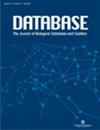IBDTransDB:人工编辑的炎症性肠病转录组数据库
IF 3.6
4区 生物学
Q1 MATHEMATICAL & COMPUTATIONAL BIOLOGY
Database: The Journal of Biological Databases and Curation
Pub Date : 2024-04-02
DOI:10.1093/database/baae026
引用次数: 0
摘要
炎症性肠病(IBD)疗法对至少 40% 的患者无效,转录组数据集已被广泛用于揭示这些患者的发病机制和确定新的药物靶点。虽然许多基于网络的工具/数据库都提供了公开的 IBD 转录组数据集,但由于这些公开数据集的元数据和数据描述不够结构化,大多数工具/数据库都不允许基于多个关键词(如结肠和英夫利昔单抗)查询数据集。此外,很少有工具/数据库能对查询结果中的数据集进行比较和整合。为了填补这些空白,我们开发了 IBDTransDB (https://abbviegrc.shinyapps.io/ibdtransdb/),这是一个人工编辑的 IBD 转录组数据库。IBDTransDB 包括一个包含 34 个转录组数据集(2932 个样本,122 个差异比较)的人工编辑数据库和一个支持 5 个属性(如组织和治疗)的 35 个关键词的查询系统。IBDTransDB 还提供三个用于数据分析和整合的模块。IBDExplore 允许对来自单一数据集的差异基因列表、通路富集、基因特征和细胞解卷积分析进行交互式可视化。IBDCompare 支持对不同条件下多个数据集中的选定基因或通路进行比较。IBDIntegrate 可进行荟萃分析,根据用户选择的数据集和条件确定基因/通路列表的优先级。通过两个与英夫利西单抗治疗相关的案例研究,我们证明了 IBDTransDB 为生物学家和临床医生提供了一个独特的平台,通过与其他全息数据的整合,揭示 IBD 发病机制并确定新的靶点。数据库网址: https://abbviegrc.shinyapps.io/ibdtransdb/本文章由计算机程序翻译,如有差异,请以英文原文为准。
IBDTransDB: a manually curated transcriptomic database for inflammatory bowel disease
Inflammatory Bowel Disease (IBD) therapies are ineffective in at least 40% patients, and transcriptomic datasets have been widely used to reveal the pathogenesis and to identify the novel drug targets for these patients. Although public IBD transcriptomic datasets are available from many web-based tools/databases, due to the unstructured metadata and data description of these public datasets, most of these tools/databases do not allow querying datasets based on multiple keywords (e.g. colon and infliximab). Furthermore, few tools/databases can compare and integrate the datasets from the query results. To fill these gaps, we have developed IBDTransDB (https://abbviegrc.shinyapps.io/ibdtransdb/), a manually curated transcriptomic database for IBD. IBDTransDB includes a manually curated database with 34 transcriptomic datasets (2932 samples, 122 differential comparisons) and a query system supporting 35 keywords from 5 attributes (e.g. tissue and treatment). IBDTransDB also provides three modules for data analyses and integration. IBDExplore allows interactive visualization of differential gene list, pathway enrichment, gene signature and cell deconvolution analyses from a single dataset. IBDCompare supports comparisons of selected genes or pathways from multiple datasets across different conditions. IBDIntegrate performs meta-analysis to prioritize a list of genes/pathways based on user-selected datasets and conditions. Using two case studies related to infliximab treatment, we demonstrated that IBDTransDB provides a unique platform for biologists and clinicians to reveal IBD pathogenesis and identify the novel targets by integrating with other omics data. Database URL: https://abbviegrc.shinyapps.io/ibdtransdb/
求助全文
通过发布文献求助,成功后即可免费获取论文全文。
去求助
来源期刊

Database: The Journal of Biological Databases and Curation
MATHEMATICAL & COMPUTATIONAL BIOLOGY-
CiteScore
9.00
自引率
3.40%
发文量
100
审稿时长
>12 weeks
期刊介绍:
Huge volumes of primary data are archived in numerous open-access databases, and with new generation technologies becoming more common in laboratories, large datasets will become even more prevalent. The archiving, curation, analysis and interpretation of all of these data are a challenge. Database development and biocuration are at the forefront of the endeavor to make sense of this mounting deluge of data.
Database: The Journal of Biological Databases and Curation provides an open access platform for the presentation of novel ideas in database research and biocuration, and aims to help strengthen the bridge between database developers, curators, and users.
 求助内容:
求助内容: 应助结果提醒方式:
应助结果提醒方式:


